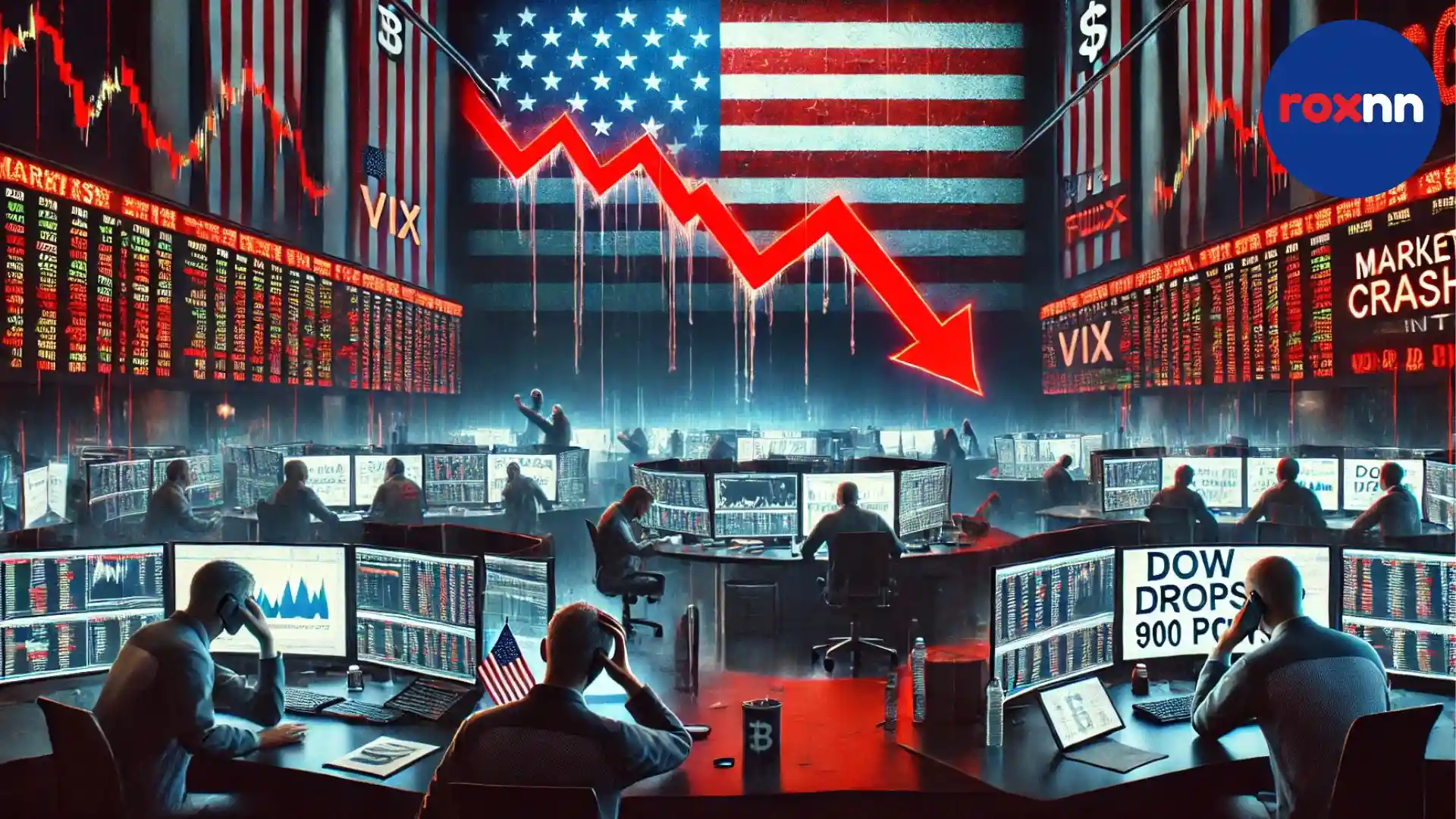New York City –
In a dramatic turn of events on Monday, the U.S. stock market faced its worst day of the year, sending shockwaves across Wall Street and raising serious concerns about the economic stability of the country. All major indexes tanked, bitcoin plunged, and the fear index (VIX) spiked to its highest level in 2025. The chaos followed comments from former President Donald Trump, who refused to rule out a potential recession, sparking widespread panic among investors.
This market rout reflects not just momentary panic but a deep-rooted anxiety about the future of the American economy, especially in light of the aggressive tariff policies and uncertain economic direction under the looming Trump 2.0 administration.
Dow, S&P 500, and Nasdaq Suffer Major Blows
The Dow Jones Industrial Average nosedived by 890 points, marking a steep fall of 2.08%, and at one point, the index had lost over 1,100 points. The S&P 500 dropped 2.7%, and the tech-heavy Nasdaq Composite plummeted 4%, its biggest single-day decline since September 2022.
Notably, both Dow and S&P 500 recorded their worst trading day of the year, while Nasdaq’s drop officially pushed it into correction territory—a clear sign of investor unease.
The relentless selloff has already wiped out all post-election gains from November, turning what seemed like a bullish start into a month of financial despair.
Tech Stocks Lead the Fall: The ‘Magnificent Seven’ in Red
The selloff was majorly driven by the technology sector. Giants like Alphabet (GOOG), Amazon (AMZN), Apple (AAPL), Meta (META), Microsoft (MSFT), Nvidia (NVDA), and Tesla (TSLA) — collectively known as the “Magnificent Seven” — all reported sharp losses.
- Tesla took the hardest hit, closing down by a massive 15.4%.
- Nvidia dropped 5%, while AI-favorite Palantir (PLTR) sank 10%.
Tesla’s fall was particularly significant, as it erased all its post-election gains, now down nearly 45% in 2025 alone. Analysts attribute this to consumer backlash against CEO Elon Musk’s ties with Trump, along with declining sales in Europe.
Investor Fear Skyrockets: VIX Hits Year-High
As market sentiment deteriorated, the VIX — Wall Street’s fear barometer — soared, reflecting extreme nervousness. CNN’s Fear and Greed Index also tilted toward “Extreme Fear,” a sentiment that has been dominating the market for over two weeks.
“President Trump’s ambiguity on recession just added fuel to the fire,” said Anthony Saglimbene, Chief Market Strategist at Ameriprise. Even though the White House later issued a statement touting “historic economic growth” in Trump’s second term, the markets weren’t convinced.
Tariff Uncertainty Deepens the Crisis
Another major contributor to the panic is the confusion around Trump’s tariff policy. Here’s a quick look at recent tariff developments:
| Policy/Change | Impact on Market |
|---|---|
| Tariffs on Chinese imports doubled from 10% to 20% | Increased cost pressure on businesses |
| 25% steel & aluminum tariff from March 12 | Affects industrial and manufacturing stocks |
| Threatened 250% tariff on Canadian dairy | Disrupts cross-border trade |
| Temporary reprieve on Canada-Mexico tariffs until April 2 | Mixed signals causing investor confusion |
This on-again, off-again trade policy has left investors frustrated and uncertain, leading many to seek safe haven assets like government bonds, causing the 10-year US Treasury yield to drop to 4.225%.
Bitcoin Dips Below $78,000 – A Sign of Broader Risk-Off Sentiment
Even the crypto market wasn’t spared. Bitcoin fell sharply to $78,000, its lowest level since November, as investors pulled out of risky assets in favor of more stable investments. This reinforces the wider economic anxiety gripping the global financial markets.
Is a Recession Really Coming? Here’s What Experts Say
The fear of recession has now become more than just speculation. Trump’s own words — referring to the current phase as a “period of transition” — did little to reassure markets. While he didn’t directly confirm a recession, his reluctance to rule it out was enough to make headlines and unsettle Wall Street.
According to economic norms, a recession is defined by two consecutive quarters of negative GDP growth. The National Bureau of Economic Research (NBER) adds that it must be a “significant decline in economic activity spread across the economy and lasting more than a few months.”
Indicators like:
- Mounting layoffs
- Slowing hiring
- Falling consumer confidence
- Rising inflation
…are all hinting toward a slowdown.
What Lies Ahead?
This week’s upcoming inflation reports on Wednesday and Thursday will be crucial. Investors are hoping for some positive data to ease fears, but if inflation continues to rise, the possibility of a deep economic downturn becomes more real.
“Until the dust settles on global trade tensions and policy clarity improves, investor caution is likely to persist,” said Sam Stovall, Chief Investment Strategist at CFRA Research.

